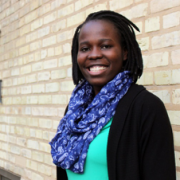 Penina Acayo Laker
Penina Acayo Laker
Penina Acayo Laker, MFA, (Washington University in St. Louis, Sam Fox School of Design & Visual Arts) is a designer and educator whose work and research are centered around topics that utilize a human-centered approach to solving social problems. She discussed health communication, effective messaging, and global perspectives. Acayo Laker's lecture is now available online (Aug. 20, session 4).
Fenaba Addo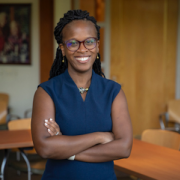
Fenaba Addo, PhD, (Associate Professor, University of Wisconsin, Madison, School of Human Ecology) examines debt and wealth inequality with a focus on family and relationships and higher education, and union formation and economic strain as a social determinant of health and well-being. She is also focused on the role that consumer and family policies serve in reinforcing these relationships. She discussed wealth disparities and COVID. Addo's lecture is now available online (Aug. 31, session 11).
 Heather Bennett
Heather Bennett
Heather Bennett, MFA, (Washington University in St. Louis, Sam Fox School of Design & Visual Arts) is a visual artist living and working in St. Louis. She discussed disruption in the arts related to COVID and the importance of empathy. Bennett's lecture is now available online (Sept. 1, session 12).
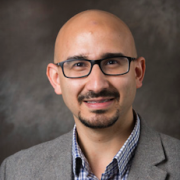 Ali Ellebedy
Ali Ellebedy
Ali Ellebedy, PhD, (Washington University School of Medicine, Department of Pathology & Immunology) studies B cell responses to viral infection and vaccination. He discussed immunity and therapeutic interventions against SARS-CoV-2. Ellebedy's lecture is now available online (Sept. 2, session 11).
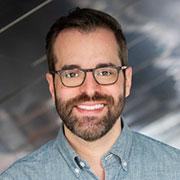 Colin Ennis
Colin Ennis
Colin Ennis, PsyD, (Private Practice) is a licensed clinical psychologist working with adults and adolescents. Committed to social justice, Ennis has presented nationally on the intersection of race, ethnicity, sexual orientation, immigrant and child of immigrant status. He discussed mental health during COVID and LGBTQ+ concerns. Ennis's lecture is now available online (Aug. 31, session 11).
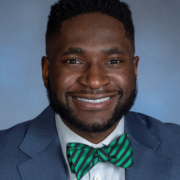 Utibe Essien
Utibe Essien
Utibe Essien, MD, MPH, (University of Pittsburgh School of Medicine) is a health services researcher who conducts research on racial/ethnic health disparities with a specific focus on the use of novel therapeutics and technologies in the management of chronic diseases and understanding mechanisms by which differences exist in their uptake and diffusion. He discussed health disparities and practicing medicine in the age of COVID. Essien's lecture is now available online (Aug. 25, session 7).
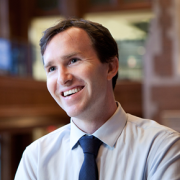 Patrick Fowler
Patrick Fowler
Patrick Fowler, PhD, (Washington University in St. Louis, Brown School) researches ways to prevent homelessness and its deleterious effects on child, family, and community well-being. He discussed homelessness and evictions during the COVID pandemic. Fowler's lecture is now available online (Aug. 26, session 8).
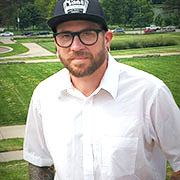
Harvey Galler
Harvey Galler (Washington University in St. Louis, Prison Education Project) is a PEP alumnus (Class of 2019) and Maggie Garb Leadership Award recipient. He is currently working towards a Bachelor of Political Science with a concentration in public policy, interns for PEP, and co-chairs the reentry committee. He spoke on COVID-19 and incarceration. Galler's lecture is now available online (Sept. 3, session 14).
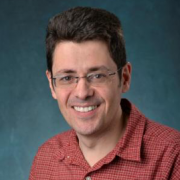 Jose-Luis Jimenez
Jose-Luis Jimenez
Jose-Luis Jimenez, PhD, (University of Colorado, Boulder) researches the development and application of advanced instrumentation for real-time, quantitative measurements of the size, chemical composition, and morphology of submicron aerosols. He discussed aerosol transmission of COVID-19. Jimenez's lecture is now available online (Aug. 18, session 2).
 Shanna Kattari
Shanna Kattari
Shanna Kattari, PhD, MEd, CSE, ACS, (University of Michigan) researches how power, privilege, and oppression systematically marginalize, exclude and discriminate against people regarding their identities/expressions through negative attitudes, policies reinforcing oppression, oppressive actions, and isolation. She discussed impact of COVID on disability/ableism and on trans and nonbinary people. Kattari's lecture is now available online (Aug. 27, session 9).
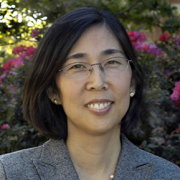 Pauline Kim
Pauline Kim
Pauline Kim, JD, (Washington University School of Law) is a nationally recognized expert on the law of the workplace and has written widely on issues such as job security, employee privacy, employment discrimination, and the effects of technology on the employment relationship. She discussed the impact of COVID on workers and the workplace. Kim's lecture is now available online (Aug. 28, session 10).
 Phoenix (Kerrie) Lintner
Phoenix (Kerrie) Lintner
Phoenix (Kerrie) Lintner (Safe Connections) is a COVID-19 Crisis Counselor at Safe Connections, a St. Louis non-profit that reduces the impact and incidence of domestic and sexual violence through youth education, 24-hour crisis care, and therapy for adult and teen survivors. She discussed intimate partner violence and safety during COVID lockdowns. Lintner's lecture is now available online (Sept. 2, session 13).
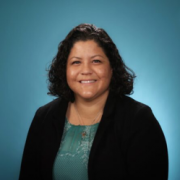 Julia López
Julia López
Julia López, PhD, MPH, LCSW, (Washington University School of Medicine, Division of Infectious Diseases) addresses gaps in research and clinical practices in the areas of sexual and gender minority health, racial disparities, HIV care, and women’s health. She discussed health disparities and concerns for Spanish-speaking, Latin, and immigrant communities during COVID-19. López's lecture is now available online (Aug. 17, session 1).
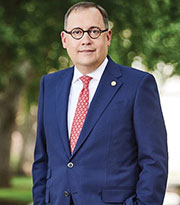 Andrew D. Martin
Andrew D. Martin
Andrew D. Martin, PhD, (Washington University in St. Louis) is Chancellor and Professor of Political Science and Law at Washington University in St. Louis. Throughout his career, Chancellor Martin has contributed widely to the areas of judicial politics, quantitative political methodology, empirical legal studies, and applied statistics, with attention paid specifically to U.S. Supreme Court decision making. He discussed higher education during the COVID pandemic, including considerations for both now and the future. Martin's lecture is now available online (Sept. 4, session 15).
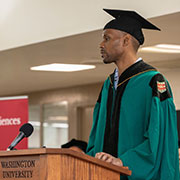
Kareem Martin
Kareem Martin, AA, PEP Alumnus, (Washington University in St. Louis) was the first graduation speaker for the WashU Prison Education Project. He discussed incarceration and COVID-19.
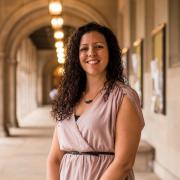 Krista Milich
Krista Milich
Krista Milich, PhD, (Washington University in St. Louis, Department of Anthropology) is a biological anthropologist who studies how both the natural and social environment can impact behaviors, physiology, and health. She discussed conservation and the environment, linking zoonotic diseases to destruction of the environment. Milich's lecture is now available online (Aug. 25, session 7).
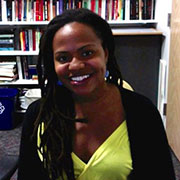
Robin Nelson
Robin Nelson, PhD, (Santa Clara University) is a biological anthropologist who utilizes evolutionary theory in studies of human sociality and health outcomes. She discussed child development and working families. Nelson's lecture is now available online (Sept. 3, session 14).
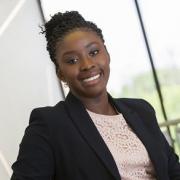 Alvitta Ottley
Alvitta Ottley
Alvitta Ottley (Washington University in St. Louis, McKelvey School of Engineering) studies user behavior, individual differences, and personalized health risk communication. Her current research interests include information visualization, human-computer interaction, and visual analytics. She discussed information visualization on a panel about effective health messaging. Ottley's lecture is now available online (Aug. 20, session 4).
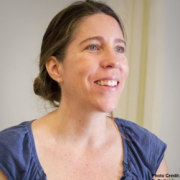 Sarah Paige
Sarah Paige
Sarah Paige, MPH, PhD, (CORE Group) is an experienced senior infectious disease advisor, with a successful track record working for companies in the public health, international development, and education sector. She discussed testing, tracing, and global perspectives on COVID-19. Paige's lecture is now available online (Aug. 19, session 3).
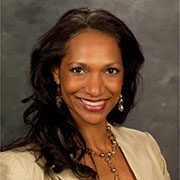
Shanti Parikh
Shanti Parikh, PhD, (Washington University, Department of Anthropology and Department of African and African American Studies) is a medical anthropologist who has conducted research on sexuality, gender, race, HIV, and risk for over 25 years. She discussed the stigma of testing and how community perspectives on COVID-19 are entangled with histories of distrust, inequalities, and ethics debates. Parikh's lecture is now available online (Aug. 24, session 6).
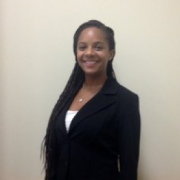 Jaszmine Parks
Jaszmine Parks
Jaszmine Parks, BA, (Safe Connections) is the crisis and community education manager at Safe Connections, a St. Louis non-profit that reduces the impact and incidence of domestic and sexual violence through youth education, 24-hour crisis care, and therapy for adult and teen survivors. She discussed intimate partner violence and safety during COVID lockdowns. Parks's lecture is now available online (Sept. 2, session 13).
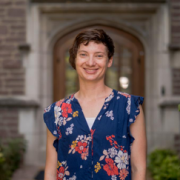 Rachel Penczykowski
Rachel Penczykowski
Rachel Penczykowski, PhD, (Washington University in St. Louis, Department of Biology) is broadly interested in the ecology and evolution of host-parasite interactions and how ecological context affects the risk of infection and consequences of disease for hosts. She discussed how to understand the numbers of the COVID pandemic. Penczykowski's lecture is now available online (Aug. 24, session 6).
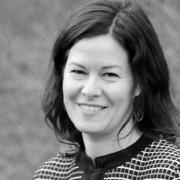 Tania Schlatter
Tania Schlatter
Tania Schlatter, MDes, (Harvard University) is a user experience and user interface designer, educator, and author who is equally interested in content, form, and people. She discussed her role developing icons – and their role in conveying important data back to the user – for Harvard’s opt-in contact tracing app. Schlatter's lecture is now available online (Aug. 20, session 4).
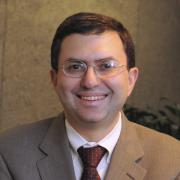 Joshua Sharfstein
Joshua Sharfstein
Joshua Sharfstein, PhD, (The Johns Hopkins University) is Vice Dean for Public Health Practice and Community Engagement, director of the Bloomberg American Health Initiative, and Professor of the Practice in Health Policy and Management. He discussed leadership and management in a public health crisis. Sharfstein's lecture is now available online (Aug. 21, session 5).
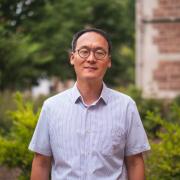 Yongseok Shin
Yongseok Shin
Yongseok Shin, PhD, (Washington University in St. Louis, Department of Economics) is an economist whose research focuses on macroeconomics and economic growth. He discussed evidence showing that the virus, not the lockdowns, is leading to economic issues. Shin's lecture is now available online (Sept. 1, session 12).
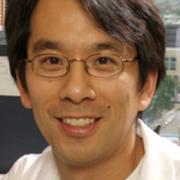 David Wang
David Wang
David Wang, PhD, (Washington University School of Medicine, Department of Pathology & Immunology) researches the interface of molecular and cellular virology, genomics, and bioinformatics with the overall goal of exploiting novel viruses to elucidate fundamental biological processes and the etiologies of human disease. He discussed zoonotic diseases, novel viruses, and SARS-CoV-2. Wang's lecture is now available online (Aug. 18, session 2).
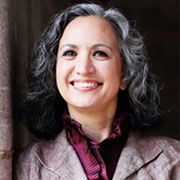
Siobhan Wescott
Siobhan Wescott, MD, MPH (Assistant Director, Indians Into Medicine, University of North Dakota) is a graduate of Harvard Medical School and national advocate for increasing the number of Native Americans in healthcare. Wescott's lecture is now available online (Aug. 26, session 8).
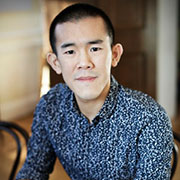
Ed Yong
Ed Yong is a science journalist for The Atlantic. His work is also featured in National Geographic, Wired, Nature, and Scientific American, among other publications. His first book, I Contain Multitudes, looks at the partnerships between animals and microbes. He has contributed some of the most important public pieces of writing on COVID to date. He spoke on science communication. Yong's lecture is now available online (Aug. 19, session 3).
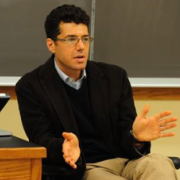 Jeffrey Zacks
Jeffrey Zacks
Jeffrey Zacks, PhD, (Washington University in St. Louis, Department of Psychological & Brain Sciences) studies how the representations in the brain and the world work together in cognition using behavioral experiments, functional MRI, computational modeling, and testing of neurological patients. He discussed how people understand processes like pandemic growth when learning from graphs, tables, and descriptions. Zacks's lecture is now available online (Aug. 21, session 5).
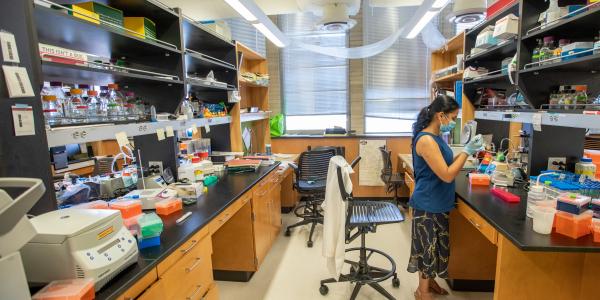
 Penina Acayo Laker
Penina Acayo Laker




















 Tania Schlatter
Tania Schlatter




